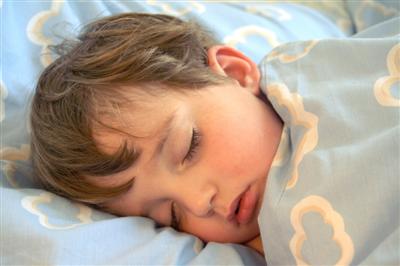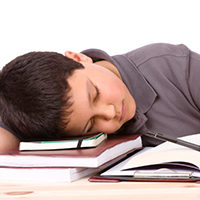Sleep disorders in children affect a child’s sleep at night, his/her daytime behavior, and the overall well-being of the entire family.
Symptoms of insufficient sleep in children and adolescents may include: mood disturbances, fatigue and daytime sleepiness, cognitive impairment, behavior problems, hyperactivity, dozing off at inappropriate times, risk-taking behaviors, and academic problems. Other common concerns that family members may notice are loud snoring, inattention, insomnia, bedwetting and other unusual behaviors at night. Sleepy children can paradoxically show symptoms of hyperactivity and not sleepiness, since children and adults behave differently when sleepy. Adults usually become sluggish, while children tend to overcompensate and speed up.
According to the National Sleep Foundation there is strong evidence that children with poor quality and insufficient sleep have symptoms that are very often similar to Attention Deficit Hyperactivity Disorder (ADHD). In particular, children with sleep disordered breathing, such as obstructive sleep apnea and children with restless legs syndrome, often exhibit these symptoms.
One study found that treating sleep problems may be enough to eliminate attention and hyperactivity issues for some children. Therefore, prior to any new diagnosis of ADHD, Iowa Sleep strongly encourages that your child undergo sleep study testing, especially before medications are considered.
Iowa Sleep completes comprehensive sleep evaluations of children ages 2 through 18. A sleep study, other tests, and/or follow-up visits may be recommended.
Some of the conditions we evaluate and treat include:
Obstructive sleep apnea — Snoring, noisy breathing
Sleeplessness —Problems getting to sleep, resisting bed- time, irregular sleep patterns
Sleep schedule abnormalities — Long naps with short nighttime sleep. In teenagers, staying awake for long hours at night and sleeping late into the day
Narcolepsy and other disorders of excessive daytime sleepiness —Combined with moodiness, hyperactivity, difficulty concentrating and learning
Parasomnias (unusual activities during sleep) —Sleepwalking and sleep talking, confusional arousals and sleep terrors, teeth grinding (bruxism), bedwetting, periodic limb movements in sleep
Restless Legs Syndrome — Unpleasant feelings, restlessness in legs during the evening or at bedtime, relieved by activity, worsened by resting
For more information about our Pediatric Program or to schedule an appointment with one of our sleep specialists, call today (855) 346-8899 TOLL FREE.

Get a better night’s sleep for your child —and you.
